- Home
- Kirsty Murray
The Year It All Ended Page 10
The Year It All Ended Read online
Page 10
‘Thea says I must enter work in the Spring exhibition, but I don’t think old Oswin will back my inclusion. He seems to find my work too “disturbing”.’
‘You should submit one of your seascapes,’ said Tiney. ‘They’re beautiful.’
‘Thea’s are finer. I’ve never seen anyone capture light on water the way she can.’
‘She’s finished that canvas she started at Christie’s Beach,’ said Tiney. ‘Come and see. It’s on the easel in her studio.’
‘Tiney, perhaps you should allow your sister to show Sebastian her own work,’ said Mama.
‘Thea won’t mind,’ said Tiney, though a flicker of doubt almost made her sit down again.
Seb followed her across the back garden to Thea’s studio. Tiney found the studio key underneath an upturned terracotta pot and unlocked the door. Seb grew quiet, almost reverent, inside the small space. He stood for a long time in front of Thea’s canvas, simply staring at the work.
‘I wish she’d submit it for the art prize, but she says she doesn’t think it’s good enough,’ said Tiney.
‘It’s perfection,’ said Seb.
‘I’d submit pictures on her behalf, but I can’t afford the entry fees,’ said Tiney.
‘I can afford it,’ said Seb.
Tiney smiled. ‘Can you really? When she wins, we’ll pay you back. But Thea mustn’t know. And we can’t possibly submit this one, she’d notice it was missing. But she has lots of canvases stored in the rack over there.’ She began to pull out some of her favourites of Thea’s paintings, showing them to Seb with sisterly pride.
‘We should put her up for every prize in the country,’ said Seb, conspiratorially. ‘The Sydney prize has a category for drawings. Thea would be a strong contender. Would she notice if some of her line drawings went missing?’
Tiney clapped her hands. ‘Perfect!’
Together, Tiney and Seb sifted through Thea’s folios, picking out several works that Seb promised to frame. Tiney took the collection of drawings and two paintings from Thea’s store of older works and slipped down the side path with them so Mama wouldn’t see Seb carry them through the house. As she snuck beneath the windows, she was reminded of playing hide-and-seek with Louis. It was almost too good to be true that Seb had the same sense of mischief and adventure as her brother.
Tiney spent the rest of the afternoon whistling while she worked at scrubbing the kitchen floor. At dinner, though, she found that Papa was grim with anxiety at the latest news from Germany.
‘How can the Germans sign the treaty when Scheidemann and his cabinet have resigned in protest against it?’ he said, gloomily. ‘The coaltion will have to form a new German government and who knows where that will lead us.’
‘But there won’t be another war,’ said Tiney. ‘There can’t be.’
‘In Paris, General Foch has ordered the mobilisation of the allied armies, and today the Germans scuttled their own ships in Scapa Flow. The German sailors are now prisoners of war. Madness, chaos.’
Tiney wanted to cover her ears. Instead she began clearing the table. As long as she was working, she could keep the dark thought of another war at bay.
Tiney had just drifted off to sleep when the loud trill of the phone echoed through the house. For a moment, she imagined someone was calling to announce the outbreak of war. Thea was first out of bed to answer it. Tiney heard the gentle murmur of her voice and then a horrible sound, like an injured animal wailing in the night. Tiney ran to the door. In the dimly lit hall, Thea lay on the floor in her nightgown, curled into a ball, rocking and moaning. The telephone receiver dangled at the end of its cord and banged against the wall.
Tiney knelt down beside Thea and tried to pull her hands away from her face, to make her speak. Mama and Papa came out of their room, their eyes wide. Mama knelt down on Thea’s other side and tried to put her arms around Thea but she wouldn’t be comforted. Papa reached for the phone and asked the operator to reconnect him to the previous caller. He listened carefully to the speaker on the other end, then he replaced the receiver.
Mama had gently led Thea into the kitchen and was making her a cup of warm milk, hoping to coax some sense from her. Papa looked down at Tiney with a numb expression.
‘It’s Sebastian Farr. He’s gone missing. The police believe he has drowned. There was a note, for Thea, among his things.’
Not even the news of peace could lift the darkness that had settled on Larksrest. On the 28th of June, 1919, the Germans signed the Treaty of Versailles but while Thea grieved for Seb, celebrating seemed unkind. Seb’s death was almost more than the family could bear.
The police had found Sebastian’s clothes, neatly folded in a small pile beside his leather shoes, at the base of the cliffs at Christie’s Beach. Ida drove Thea and Tiney down to the cottage at the beginning of July in the hope it would give Thea a chance to grieve properly. Though Adelaide bustled with plans for Peace Day celebrations in late July, Ida decided she would stay with the Flynn sisters at Christie’s Beach as long as they needed her.
Thea spent most days standing on the clifftop above Christie’s Beach staring out at the horizon. It was frightening for Tiney to see her sister standing so still, so frail, as if an updraft might sweep her into the sky. She wanted to drag Thea inside, to keep her somewhere safe and sheltered.
Every morning, Thea rose at dawn and walked down the winding track to the cliff edge to watch the sea, as if staring might bring Seb back to her, as if the waves might part and she would see him rise from the ocean like a Greek god. And every morning Tiney would follow her, picking her way carefully over rocks and low scrub to watch over her sister and stand vigil.
In the olive grove
Tiney heard the front door slam. She stumbled out of bed and pressed her face against the bay window in time to see a figure disappearing down the front path in the moonlight. She thought it would be Thea. Thea who couldn’t sleep, who could be found at all hours of the night sitting in her studio, sketching as though only by touching pencil to paper could she keep her grief at bay. But the figure disappearing down the front path wasn’t Thea.
‘Pa,’ whispered Tiney.
Everyone had been so busy worrying about Seb’s death and Minna’s disappearance that no one but Tiney had noticed the fading of their father. If Tiney asked him to come out for an evening walk, he shook his head and stayed at his desk, sipping at a teacup that Tiney knew held only whisky, not black tea. He sat in his study in a fug of old tobacco and alcohol, making notes in the scrapbook of Louis’ life. Not even Mama challenged him, Mama who loved him best.
Tiney had seen he wasn’t right. One afternoon, she had found him standing outside Larksrest, staring at the house as if he wasn’t sure he lived there. Then he sat down in the gutter like a tramp, like a swagman. Mama had gone outside and spoken to him softly, cajoled him from the gutter and to his desk again. Back in his study, he wrote more letters. Anxious, plaintive letters, asking for more information about Louis’ death, but no single detail was enough to sate his longing.
Papa hadn’t spoken to anyone for days after he discovered he couldn’t collect Louis’s effects from the AIF because Louis had written in the Pay Book that his mother was his legatee. Though they’d opened the parcel together, though it was only a formality that the package was addressed to Mama, he questioned why Louis hadn’t nominated his father. He combed over each and every memory of Louis’ life as though to view it through different prisms.
Every day, he worked on his scrapbooks, adding furious notations. He wouldn’t brook conversation about the photo of the woman and child. It puzzled him. It didn’t fit among the pieces he was using to shape the history of his son. The records from the Red Cross arrived and a letter from a soldier who had been at Louis’ burial. Mama said it was a comfort but Papa said it was a version of a story that thousands had already heard about their sons: the padre said prayers, his mates laid him to rest. They made a cross of wood and painted it. They set it above his grave.
As the last of the letters about Louis’s death arrived, Pa copied out passages of them into notebooks. He sorted newspaper clippings, sifted through every letter Louis had ever written and wrote up an itinerary of Louis’s movements in Belgium and France.
‘He was injured here,’ said Pa, touching his head, ‘and here,’ his hand resting on his thigh. ‘Some say he died that day, others that it was the day after. Did he speak? Do you think he was in pain?’ On and on he went, tormenting himself with the details.
But the detail that frustrated Papa the most was the uncertainty about where Louis was buried. The place was named the ‘Buire British Cemetery’ but there were so many Buires on the map of northern France that Papa couldn’t decide which was the right one. Another report arrived saying the cemetery was near Tincourt, and the whole family puzzled over the map together. Where was Louis? No one could be sure. Once the last letters arrived, something went out of Pa.
Visits from either of the McCaffreys only made things worse. To see living, breathing men return when his only son would never cross the threshold of Larksrest broke something inside him. When Sebastian died, Papa was bewildered and enraged – not only because Thea had been so hurt, but that anyone could come home from the war and throw away a future for which millions of men had fought and died. Seb’s death triggered something deep and disturbing in each of the Flynns. The fractures that had riven the family since the news of Louis’ death became chasms.
Tiney dressed quickly in the dark, not wanting to wake Thea. The July night was cold. She slipped on a gabardine overcoat, pulled her hair back into a ponytail and flung a scarf over her head. She drew the front door shut as quietly as she could. In the street, there was no sign of her father. She closed her eyes, trying to intuit which way he might have walked. He always turned left if he was going for a long walk through the parklands to eventually reach the river Torrens. If he was going to North Adelaide, he’d turn to the right. But it was the middle of the night. Why would he be going in either direction? Instinctively, Tiney turned right and hurried towards Robe Terrace. The wide street was empty. In the far distance she could see the lights of a brougham cab. A half-moon cast a thin light across the parklands.
Tiney could make out a dark figure moving slowly across the Pound Paddock, the wide stretch of raggedy grassland that separated Medindie from North Adelaide. The park had grown wilder during the war years, the grass a home for snakes, the paths untended. Tiney and her sisters avoided it. Clutching the collar of her coat she hurried across Robe Terrace, following her father.
At first she thought he was heading towards North Adelaide, and her heart sank. She couldn’t bear the thought of having to retrieve him from inside an illegal speakeasy, a dark and gloomy cellar, rank with the stench of alcohol. Frank had told her about those places, where returned soldiers went to drown their misery.
She quickened her pace, hoping to catch him before he crossed LeFevre Terrace, but as the gap closed between them, she became less sure of his direction. He seemed to be wandering in a purposeless fashion, weaving between the trees, disappearing into the shadow of a gum and then reappearing further east towards Kingston Terrace. It was only as he drew nearer to North Adelaide that Tiney realised they were not alone. There were two other figures wandering in among the trees in the darkness of the night. Tiney tried to keep her gaze fixed steadily on her father. She didn’t want to think of why there were other men in the park in the middle of the night, nor of what they might do to her if they decided to accost her. She broke into a run, racing to catch up with her father as he crossed into the top end of North Adelaide. He had quickened his pace too and she was just in time to see him turn left into a side street.
It was a relief to be out of the parklands and away from the shadowy wandering men, but now she had lost sight of Papa. She stood clutching a fencepost, catching her breath. She had no idea her father could move so swiftly. She wondered if she could actually catch up with him. But the thought of abandoning the chase and then having to cross the Pound Paddock and return home without her father was more frightening than wandering through the sleeping streets of the town. As she debated what to do, Tiney noticed something odd. Though it was after two a.m., there were men as purposeless as her father wandering the streets. When she turned into Stanley Street and nearly collided with a young man, the man apologised gruffly, shoved his hands deeper into his pockets and kept walking. He neither registered nor cared that Tiney was a young woman alone.
Tiney heard a clock chime the hour. Three o’clock. Was this what the town was always like in the middle of the night, the darkness peppered with men wandering wild-eyed? She saw a man sitting in his dimly lit living room, framed by a window, his head in his hands. She heard a baby cry. A dog bark. Then to her relief she caught sight of Papa again, crossing over into the park, into the olive groves.
Papa had loved to take them for picnics in the olive groves when they were little. Nette and Ma thought it a shoddy place for a picnic. Why not the riverbank? Or the Botanical Gardens? But Pa like the wild scruffiness of the olive grove with its dips and hollows and dry yellow grass. He would tell them that the first Europeans to come to Adelaide had planted the grove and that the trees would still be there in thousands of years, like the Garden of Gethsemane. He told them it was a place where spirits roamed, where a man could find his god.
Tiney knew where her father would be heading for now. There was a rock that Louis had liked to sit upon whenever they visited the grove as a family. Papa had christened it Louis’ Rock.
In a hollow between the twisted olives, Tiney found her father. His black hair had turned silver these past months, his eyes sunken deeper into his face. His hands were knotted together, as if in prayer, though she knew her Pa never prayed. She stood in front of him and slipped the scarf from her head so he could see her face in the moonlight.
‘Papa,’ she whispered. When he didn’t look at her, she put a hand on his shoulder. ‘Pa, we should go home. There are men, walking about in the streets. I think they’re soldiers. I want you to walk home with me.’
She sat down on the rock beside him and slid her arm around his shoulders. He was trembling and muttering to himself. She leaned her ear close, to hear his voice. ‘Father, if thou wilt, remove this chalice from me. . . And there appeared to him an angel from heaven. . . And being in an agony, he prayed the longer. And his sweat became as drops of blood, trickling down upon the ground.’
Then he turned and looked straight into Tiney’s face and said again, ‘Drops of blood, trickling down upon the ground. The Garden of Gethsemane and the Rock of Agony.’
For the first time that evening, Tiney felt truly afraid.
‘Don’t, Pa,’ she said. ‘You shouldn’t have come out, you’re not well.’
‘Where can we go to mourn him? There’s nowhere to go. No place to remember him. Do you remember him here, in the olive grove?’
The moonlight caught the fever glistening in her father’s eyes. He coughed and shivered again.
‘We have to get you home,’ she said, wedging herself beneath her father’s arm and standing up, forcing him to his feet. The top of her head barely reached his shoulder but it meant she was the perfect size to act as a crutch. All her fear was overridden by a sense of urgency.
Normally she would have taken two steps for every one of her father’s, but that night his gait was reduced to a shuffle. She tried not to listen to his ravings. He muttered of tombs and blood and sacrifice, and coughed and wept.
Tiney kept her head down. The tie in her hair fell out. She dropped her scarf. But still she kept walking, past the lonely wandering men in Stanley Street, through the Pound Paddock, ignoring the shadows and her fears. By the time she finally led Papa under the portico at Larksrest, she didn’t care if she woke the whole house. She lifted the brass knocker and banged it down hard.
When Thea opened the door, Tiney wanted to cry but instead she spoke urgently. ‘I think Pa has the influenza,’ she said, keeping terr
or from her voice.
Tiney slept heavily but only for a few hours. She woke at dawn. Thea wasn’t in her bed beneath the window. Tiney put on her dressing gown and stepped out into the hall. In the kitchen, her mother was at the stove and the kettle was boiling on the hob, sending up a plume of steam into the crisp morning air.
Across the hallway, their father lay in the cot in his study. Thea sat in a chair beside him, a small bowl of water in her lap. She dipped a cloth into it and wiped Pa’s brow. His face was a strange colour, almost blue, and a tiny fleck of foamy blood was caught in his beard. Thea wiped it away as Tiney drew close.
‘Mama called the doctor but he can’t come until later,’ said Thea.
‘But we need him now!’ said Tiney, alarmed by how much worse Papa had grown in the course of a few hours.
‘I wish Nette was here,’ said Thea, lowering her voice. ‘We need Nette.’
‘You know she can’t come to Adelaide with the baby while the influenza is still raging,’ said Tiney. ‘It’s Minna we need. She’s the one Papa misses most. We need Minna to come home.’
Papa made a desperate gargling sound in the back of his throat and shuddered. Thea looked at Tiney and put her finger to her lips. Papa began to shiver, his whole body trembling and shaking until the bed began to knock against the wall.
‘Mama!’ called Tiney, as she and Thea tried to loosen their father’s shirt. Mama came into the room with a bowl of cold water and cloths.
‘We must bring his fever down,’ she said.

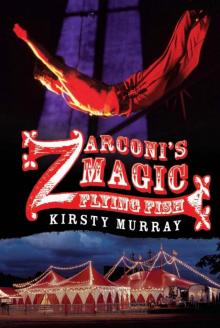 Zarconi’s Magic Flying Fish
Zarconi’s Magic Flying Fish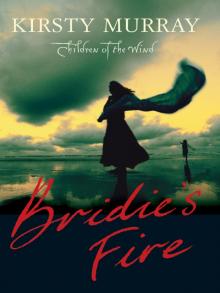 Bridie's Fire
Bridie's Fire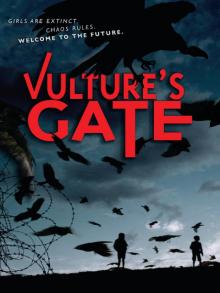 Vulture's Gate
Vulture's Gate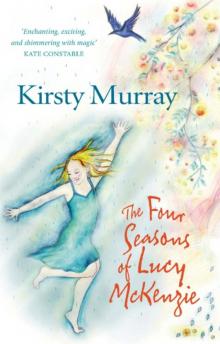 The Four Seasons of Lucy McKenzie
The Four Seasons of Lucy McKenzie A Prayer for Blue Delaney
A Prayer for Blue Delaney The Year It All Ended
The Year It All Ended India Dark
India Dark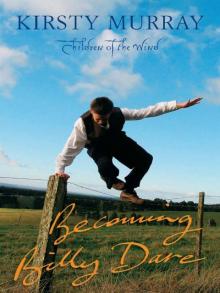 Becoming Billy Dare
Becoming Billy Dare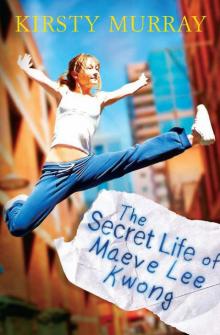 The Secret Life of Maeve Lee Kwong
The Secret Life of Maeve Lee Kwong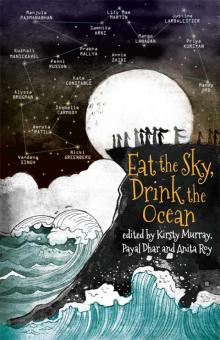 Eat the Sky, Drink the Ocean
Eat the Sky, Drink the Ocean